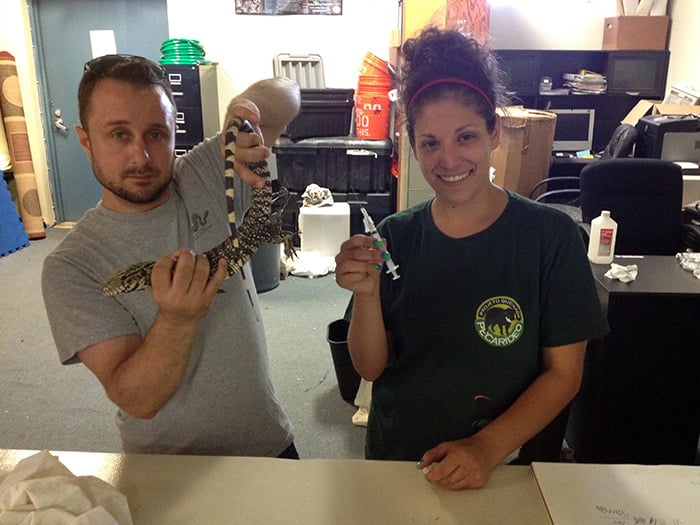
By Lana Sweeten-Shults
GCU News Bureau
Burmese pythons get all the press when it comes to the invasive species game in Florida. But pythons aren’t the only invasive species making themselves at home in a place that really isn’t their home.
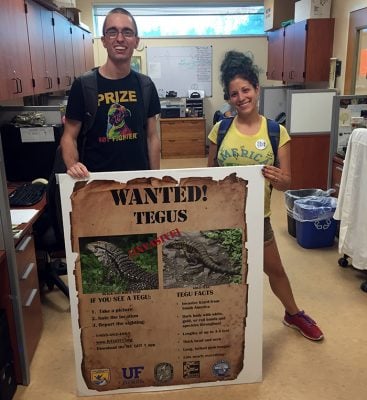
Tegu lizards, native to South America, have been wreaking ecological havoc in Florida since humans introduced them through the pet trade. They have been reported in 35 Florida counties and have been found in Georgia and South Carolina with sightings in Alabama, Texas and Louisiana. Since 2012, around when they started breeding in the wild, about 10,000 tegus have been found in Florida, according to the state’s Fish and Wildlife Conservation Commission, though Grand Canyon University biology and environmental science professor Rachel Pikstein estimates 15 times that number in South Florida alone.
They’re astonishingly adaptable, thanks to habitat and diet diversity. They’re able to burrow and survive below-freezing temperatures. They’re incredibly intelligent and tout high fertility rates.
And that’s all good for the tegu, but not necessarily for Florida.
Although they do provide a positive ecosystem service by dispersing seeds and planting new habitat, thanks to their scavenger diet, they also have an appetite for alligator, sea turtle, crocodile and tortoise eggs. That dietary penchant isn’t a plus for the Everglades, one of Florida’s most ecologically precious – and fragile – natural resources.
And the cost to manage invasive species exceeds hundreds of millions of dollars. Managing Florida’s invasive plants, alone, according to a 2018 article in nature.org, is estimated at $100 million annually, and “the cost of animal management could easily exceed this.”
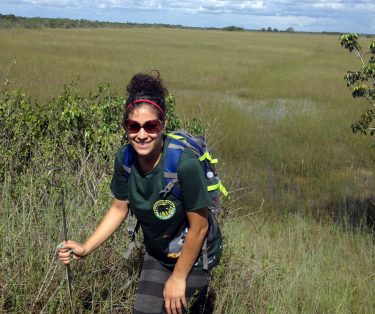
Because of this ecological conundrum, in 2021, the state added tegus to the prohibited species list, meaning no one is allowed to sell, breed, trade or own tegus, except for research and educational purposes.
It’s a problem that caught the attention of Pikstein, who has taught for almost six years at GCU and helms the Pikstein Lab in the College of Science, Engineering and Technology’s Research and Design Program.
The tegu-lover – she owns two as pets, Omega and Falkor – has been studying Florida’s invasive tegu population, gathering data from about 800 animals (and drawing blood on 600 of them) over seven years.
She has brought that data to GCU, where students joined her two years ago in taking a half-finished study and turning it into the GEATI project (Genetic Ecological Assessment of the Tegu Invasion). GEATI has brought together a cross-country and international cooperative of researchers, herpetologists, government agents, reptile breeders/importers and hobbyists, four universities and a veterinarian, to name a few.
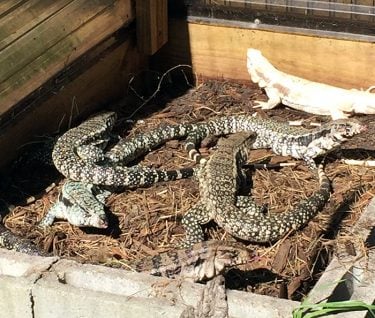
“The general idea among researchers is usually that they (tegus) are too damaging (to the environment) to assess a big picture; they just want them removed ASAP,” Pikstein said. “My students and I feel it is a complicated conservation issue that deserves the proper analysis this amazing species is due.”
The study was 80% done but lacked the funding for its genetic portion. So GCU students helped develop a funding proposal, which the Research and Design Program approved.
The RDP also is funding travel this summer to Texas Christian University, where Pikstein and her students will work with conservation geneticist Dr. Dean Williams as they prepare their data for a series of papers, the first of which they hope will be published this year.
“This is my oldest, most developed and most personal project,” said Pikstein, who also has worked with GCU students to create hatch boxes for Arizona’s cactus ferruginous pygmy owl and to create a plant guidebook to help Indonesian oil palm farmers farm more sustainably.
Getting involved
After earning her bachelor’s degree from Michigan State University in 2008, Pikstein moved to Florida, a state she visited often as a child, chasing after the populous green anoles that would scurry about.
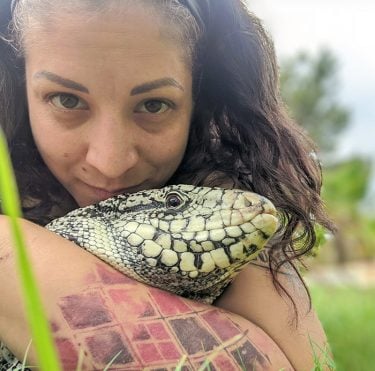
She entered a program to become a science instructor and quickly landed a teaching job. That’s when she fell in love with research, decided to become a professor and embarked on her next adventure in 2012: graduate school. During those years, “I got really passionate about some issues,” she said, noting how “Florida is one of the worst in the world, only second to Hawaii, when it comes to U.S. invasive species.”
Florida has succumbed not only to the tegu and green iguana but to the lionfish, which ingest juvenile reef fish, and the toxic cane toad, which humans introduced to rid sugar cane fields of pests (instead, it eats everything in its path).
“It’s a really big issue. Florida’s got more nonnatives than natives, more invasives than natives, arguably, in some regions,” Pikstein said.
She noticed the green anoles native to Florida that she used to catch as a child, a decade later, “were extremely hard to find,” though Haitian brown anoles and curly tails from the West Indies were everywhere.
She first became aware of the tegu – dog-size lizards with pretty spotted scales that can reach up to 6 feet long – after a friend introduced her to his pet tegu.
“I thought it was the coolest, this big lizard that was puppy-dog tame and very friendly, easygoing,” she said, though with 1,000 newtons of jaw compression, they’re not for your average pet owner. “I fell in love with them. I was in grad school, I was learning about invasive species, I was learning about them locally, and I was just fascinated to get involved.”
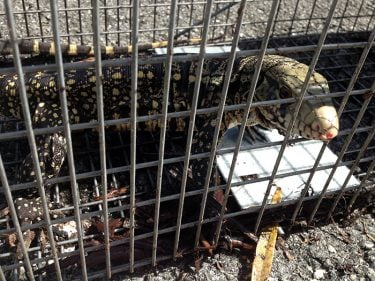
Their demeanor is probably why they are so popular in the pet trade. The lizard in the 1980s was thought to be the most exploited reptile in the world – millions of tegu skins were exported in the leather trade, according to a 2020 article in National Geographic.
The species Pikstein is studying is the Argentine black and white tegu, or Salvator merianae, in South Florida.
She and her team gathered, over seven years, extensive morphological data on the tegu. They pulled blood, photographed their bellies and backs to analyze color, counted scales, photographed their heads for size, looked at weight and length, and looked at proportions of nose to eye and eye to ear.
All that data – those 800 samples – have ended up at GCU.
A boost from RDP
Pikstein’s goal is to evaluate comparative populations of these lizards from diverse samplings of invasive and captive-bred tegus in the United States, captive-bred European populations and also South American wild imports.
The tegus in the Everglades, a founder population, have reproduced so exponentially and so successfully that it is a unique opportunity to study short-term evolutionary changes through geneflow and genetic adaptability, Pikstein said.
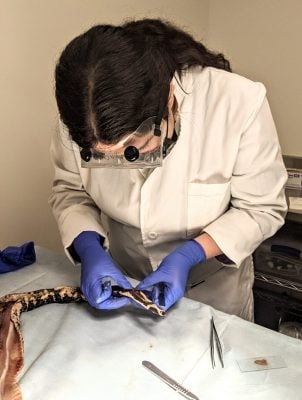
Kyla Chavez, who graduated from GCU in December with her bachelor’s degree in biology with an emphasis in pre-medicine, has studied tegu lizard data for months now with project partner and biology/pre-med major Peyton Gadbery, slated to graduate this April.
They connected with the project through the GCU Pre-Vet Club, which Pikstein mentors with Dr. Sandy Bledsoe.
Because of their work on this project, Chavez and Gadbery received the Best Poster award at the GCU 2021 Spring RDP Symposium. They also developed laboratory skills they’ll need in veterinary school – Chavez was accepted to Midwestern University recently, and Gadbery is in the application process. And they are gaining invaluable experience working with a conservation geneticist.
“This project is a great example of the networking offered by us in RDP, which is all about experiences that add to a student’s future,” Pikstein said.
Just some of what the students have found in mining through Pikstein’s data: Captive-bred populations are bigger across the board, Pikstein said, because of their “spoiled pet” lifestyle and diet in captivity. Noses tend to be longer with invasives and even longer with wild-caught. Dorsal coloration was consistently darker among invasive populations.
Also, invasives and wild-caught have significantly higher scale counts than captive-bred samples, specifically around their lips and eyes. The team hypothesizes that’s because greater scale abundance leads to improved osmoregulation and thermoregulation and assists with camouflage.
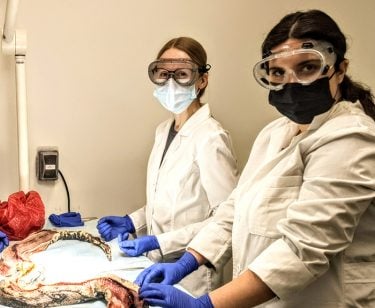
Pikstein said these differences seem to point to population generations quickly evolving toward matching the phenotypic expectations for the South American wild-type tegu, showing selection pressures on them to adapt to their environments are much stronger outside of captive conditions.
“The plan is to find the data on why those differences occur — or is it just a fluke?” Gadbery said.
“We want to further analyze how efforts can be applied to help eradicate invasive species based on looking at all their evolutionary differences,” said Chavez. “It can help wildlife specialists in that effort.”
Ultimately, the GEATI team wants to learn everything about the tegu it can to assist in managing it as a resource in South America and to help manage it as an environmental problem in North America. It’s a two-sided conservation conundrum. “We want to help with both,” Pikstein said.
With the morphometrics complete, the team will work with Williams this summer to help the team add important genetic data to the study.
“These lizards are being exploited everywhere they are found, with almost no analysis of their genetic variation,” Pikstein said, adding how genetic diversity determines the potential fitness of a population and, ultimately, its long-term persistence.
Pikstein hopes this research can help conservation efforts in what she sees as a truly amazing animal.
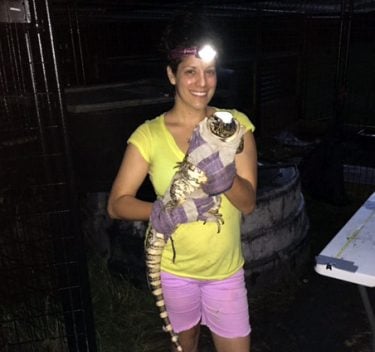
“Florida has arguably more unique, endemic species — those found nowhere else in the world — than anywhere else in the country. At the same time, you have a beautiful, intelligent animal being slaughtered there, and everywhere.
“No one’s really studying anything about them, despite how amazing they are from the perspective of evolution, conservation and animal behavior. They’re just a really incredible animal, and they deserve their whole story told.”
GCU senior writer Lana Sweeten-Shults can be reached at [email protected] or at 602-639-7901.
****
Related content:
GCU Today: Professors release inner fan boy, girl at Fan Fusion
GCU Today: Geoscientist says he has the dirt on dinosaurs, creation



































































